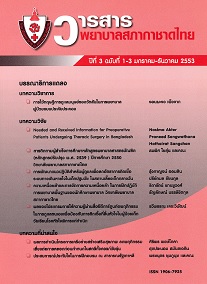การพัฒนาแนวปฏิบัติสำหรับผู้ดูแลเพื่อลดอัตราการติดเชื้อระบบ ทางเดินหายใจในเด็กปฐมวัย ในสถานเลี้ยงเด็กกลางวัน
Keywords:
แนวปฏิบัติสำหรับผู้ดูแล, การติดเชื้อระบบทางเดินหายใจในเด็กปฐมวัย, สถานเลี้ยงเด็กกลางวัน, Clinical Practice Guideline for Caregivers, Respiratory Tract Infection Rate in Early Childhood, Child Care CenterAbstract
การติดเชื้อระบบทางเดินหายใจ เป็นปัญหาที่พบบ่อยในสถานเลี้ยงเด็กกลางวัน และมีสาเหตุสำคัญคือ ผู้ดูแลเด็ก การศึกษาครั้งนี้มีวัตถุประสงค์เพื่อพัฒนาแนวปฏิบัติสำหรับผู้ดูแลเพื่อลดอัตราการติดเชื้อระบบทางเดินหายใจในเด็กปฐมวัย ในสถานเลี้ยงเด็กกลางวัน โดยประยุกต์กระบวนการใช้ผลงานวิจัยตามกรอบของไอโอวา ซึ่งแนวปฏิบัตินี้พัฒนามาจากการรวบรวมงานวิจัยในช่วงปี ค.ศ. 1996 – 2009 รวม 10 เรื่อง แนวปฏิบัติที่ถูกพัฒนาขึ้นนั้นได้ผ่านการตรวจสอบความถูกต้องเชิงเนื้อหา โดยผู้ทรงคุณวุฒิ 4 ท่าน ซึ่งผู้ดูแลเด็กทุกคนต้องมีความรู้ และทักษะในการดูแลเด็กเพื่อควบคุมและป้องกันการติดเชื้อระบบทางเดินหายใจ โดยกำหนดไว้ 2 รูปแบบ คือ บทบาทสำหรับผู้ดูแลเด็กในการป้องกันการติดเชื้อ ณ จุดรับเด็ก 2 จุด คือ จุดรับเด็กหน้าประตู ซึ่งจะทำการซักถามความเจ็บป่วยของเด็ก และประเมินสภาพเด็กเบื้องต้น จุดที่ 2 คือ จุดรับเด็กในห้องเรียน ซึ่งจะซักถามข้อมูลเพิ่มเติม และประเมินสภาพร่างกายเด็กซ้ำและพาเด็กไปล้างมือ ส่วนบทบาทตามแนวปฏิบัติ แบ่งเป็น 4 บทบาท ได้แก่ บทบาทในการป้องกันการติดเชื้อ การควบคุมพฤติกรรมของเด็กในการดูแลความสะอาด การปฏิบัติที่เกี่ยวข้องกับนโยบายขององค์กร และการเป็นแบบอย่างที่ดี
Development of Clinical Practice Guidelines for Caregivers to Decrease the Rate of Respiratory Tract Infection during Early Childhood in Child Care Centers
Respiratory tract infections in young children commonly occur in child care center where the most important factor is the caregiver. This study aimed at develop practical guideline for caregivers to decrease the respiratory tract infection rate during early childhood in child care centers. The IOWA Model of evidence-based practice to promote quality care was used as the framework for this study. The practical guidelines were developed after an examination of all relevant research papers and other related evidence for the period 1996-2009. Ten research studies were selected on the basis of merit for possible utilization. The practical guidelines were developed, and validated by four experts. The caregivers who may use these guidelines require the knowledge and skills to control and prevent respiratory tract infections in children during early childhood. The role of caregivers in child care centers has two parts since prevention can occur in two places. The first place is at the front door. Caregivers need to ask brief questions about each child’s health during the initial assessment. Later, when the children are in the classroom, they need to ask more questions, and to conduct primary screenings on the children’s physical condition, and then take the children to wash their hands. During working hours, all caregivers have to take 4 roles : a prevention role, teaching role to alter each child’s behavior in terms of hygiene, a policy compliance role, and that of being a role model.
Downloads
Issue
Section
License
เนื้อหาบทความหรือข้อคิดเห็นต่างๆ ในวารสารพยาบาลสภากาชาดไทยนี้ เป็นความคิดเห็นของผู้เขียนบทความ ไม่ใช่ความเห็นของกองบรรณาธิการ หรือสถาบันการพยาบาลศรีสวรินทิรา สภากาชาดไทย






